PHOTO: Radio Ozodi (RFE/RL’s Tajik Service). In the photo are the children of Daler Imomali, a Tajik journalist and blogger sentenced to 10 years in prison.
1/ KEY FINDINGS
In Tajikistan, 92 cases of attacks/threats against professional and civilian media workers, and against editorial offices of traditional and online publications, were identified and analysed in the course of the research for 2022. Data for the study were collected using open-source content analysis in three languages: Russian, Tajik and English. This report also includes unpublished data obtained via expert interviews. It is worth noting that the data is impacted by the fact that many attacks on media representatives are not made public or reported by the victims. This is often due to the threat of further attacks and persecution. A list of the main sources is provided in Annex 1.
- The total number of attacks on journalists and media workers increased by more than five times compared with 2017 (from 17 to 92).
- In 2022, 80% of attacks on journalists were committed by government officials. Nearly all recognised methods of exerting pressure on journalists were used, ranging from physical to legal attacks. Six cases of torture were also recorded.
- Tajik journalist Faridun Khairullozoda, 27, died in unexplained circumstances, likely by suicide. At the request of the journalist’s relatives, the results of the investigation have not been disclosed.
- In May 2022, following the suppression of protests in eastern Tajikistan, three journalists from the region were accused of “organising and participating in protests” and given lengthy prison sentences.
- Non-political bloggers, mostly female, have also faced persecution by the Tajik authorities for allegedly attacking the honour and dignity of Tajik women.
2/ THE POLITICAL SITUATION AND THE MEDIA IN TAJIKISTAN
In Reporters Without Borders’ Press Freedom Index for 2022, Tajikistan ranked 152nd, down 10 points from 2021, when there were far fewer attacks on media workers, independent journalists and bloggers. Tajikistan ranked between Sudan and Belarus.
In 2022, Reporters Without Borders introduced new methodologies to compile these rankings, which takes into account five additional factors impacting press freedom. This includes the political, economic and sociocultural context, legal framework and security situation in the country of focus.
In 2022, three events shaped the political landscape in Tajikistan and impacted human rights defenders and media workers in the country.
First was the war in Ukraine, which affected Russian-Tajik relations. The Taijk government has not announced any official position on Russia’s war in Ukraine due to its strong dependence on remittances from migrants working in Russia. Any attempts made by Tajikistan to align itself with Western countries such as the United States are met with Russian extortion and mass detentions of Tajik migrants.
At the same time, in September and October 2022, Tajikistan’s capital Dushanbe became a haven for Russian citizens fleeing the mobilisation against Ukraine. Tajikistan was, however, only a temporary refuge for most of these people.
The second factor was authorities’ suppression of mass protests in the Gorno-Badakhshan Autonomous Province, which led to the death of 34 civilians. Under the pretext of suppressing protests, authorities eliminated the remaining de facto leaders of the region, who held authority among the residents of the Pamir mountains. More than 200 people were detained and given lengthy prison sentences (up to life in prison) on charges of extremism, attempting to overthrow the government and other serious crimes.
Almost all public organisations operating in the region were shut down, and their leaders arrested. This also affected the human rights situation in the country’s capital. Some non-governmental organisations were forced to close, while many human rights activists, fearing criminal prosecution, left the country.
Lastly, an armed clash took place on the border with Kyrgyzstan from September 14 to September 17 2002, during which both sides used artillery, automatic weapons and multiple launch rocket systems, amongst other weapons.
Both countries accused the other of initiating the conflict. Sixty-three people died on the Kyrgyz side, while 59 died on the Tajik side (about 200 were also injured on both sides). The conflict was resolved after so-called “peace” deals were signed by the heads of the two countries’ security services. Following this, however, both parties repeatedly accused each other of violating the agreements. Only journalists who agreed to cooperate with law enforcement agencies were allowed to cover events on the border in September 2022. Other journalists were only able to access the conflict zone after troops were withdrawn.
In 2022, approximately 500 public organisations were closed down in Tajikistan and the situation surrounding freedom of speech became increasingly dire.
3/ GENERAL ANALYSIS OF ATTACKS
The number of attacks on media workers in 2022 has been unprecedented over the past decade. There were 92 cases of attacks on media workers and bloggers, 61 of which were committed by the authorities via legal means. Eight of these cases resulted in long prison sentences for journalists, ranging from seven to 21 years in prison. Since 2017, the number of incidents has increased by more than five times. Slander against journalists and bloggers on both state media outlets and anonymous social media channels continued in 2022.
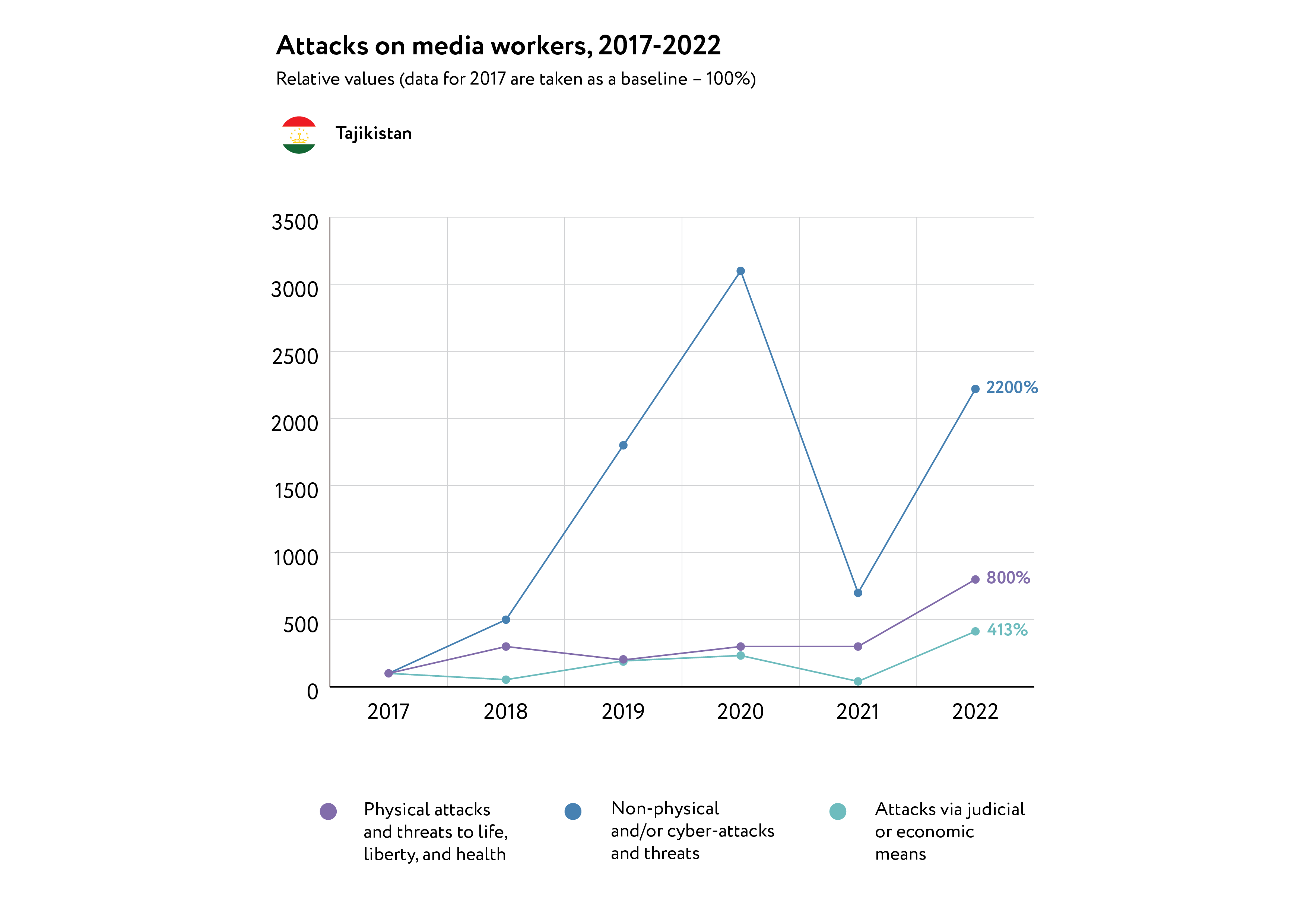
Of the 92 recorded attacks, 73 were committed by government officials, 14 by unknown persons, and six by individuals who were not representatives of the authorities. There were a record-breaking eight instances of physical attacks.
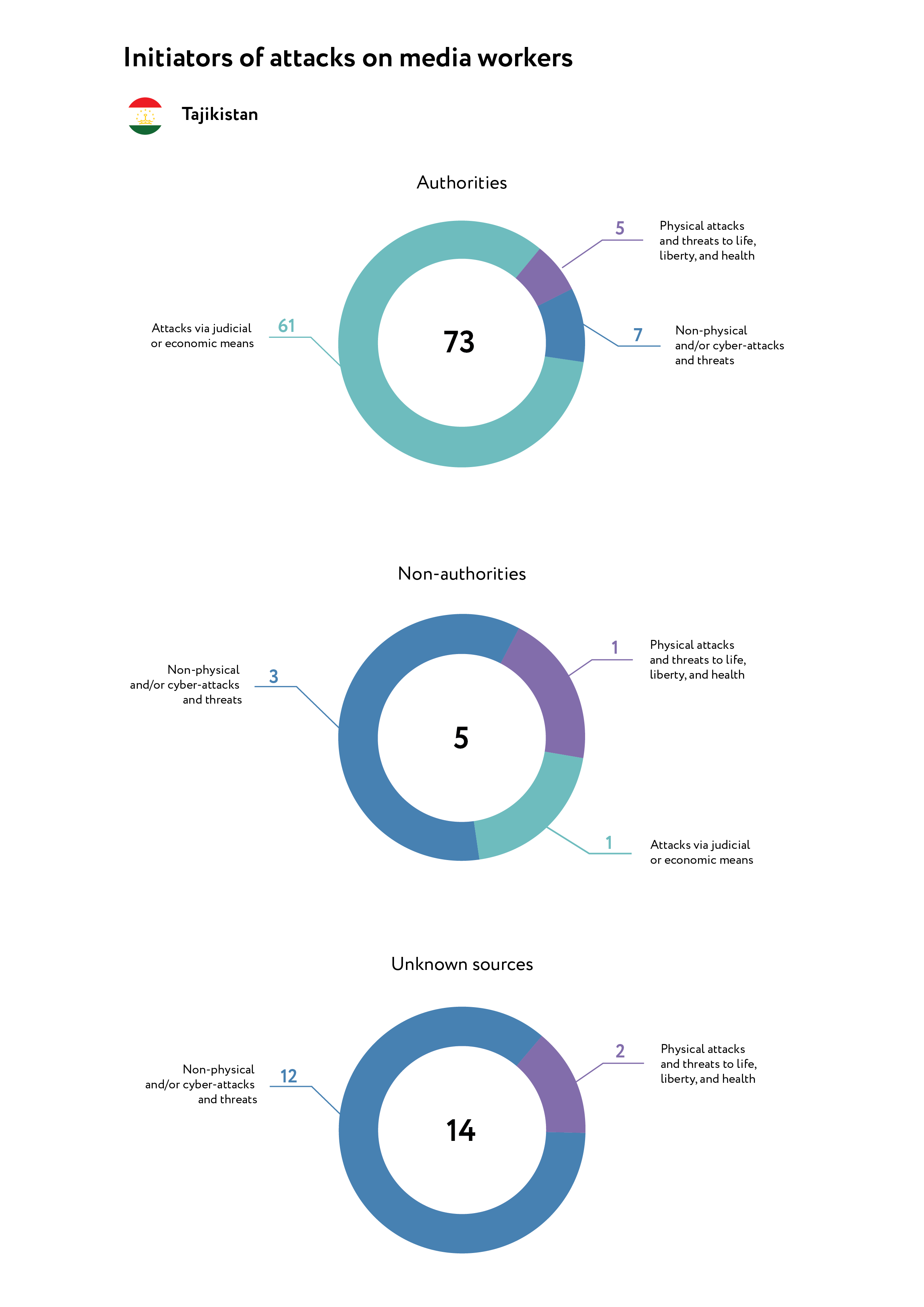
It should be noted that these figures do not necessarily paint a complete picture of the situation. Journalists often prefer not to report these attacks because, based on previous experience, they believe the attackers will not be punished. In addition to this, they are used to receiving threats and often consider them to be part of the job.
4/ PHYSICAL ATTACKS AND THREATS TO LIFE, LIBERTY AND HEALTH
In 2022, eight physical attacks were recorded. Not once since 2017 has the number of attacks of this type exceeded three.
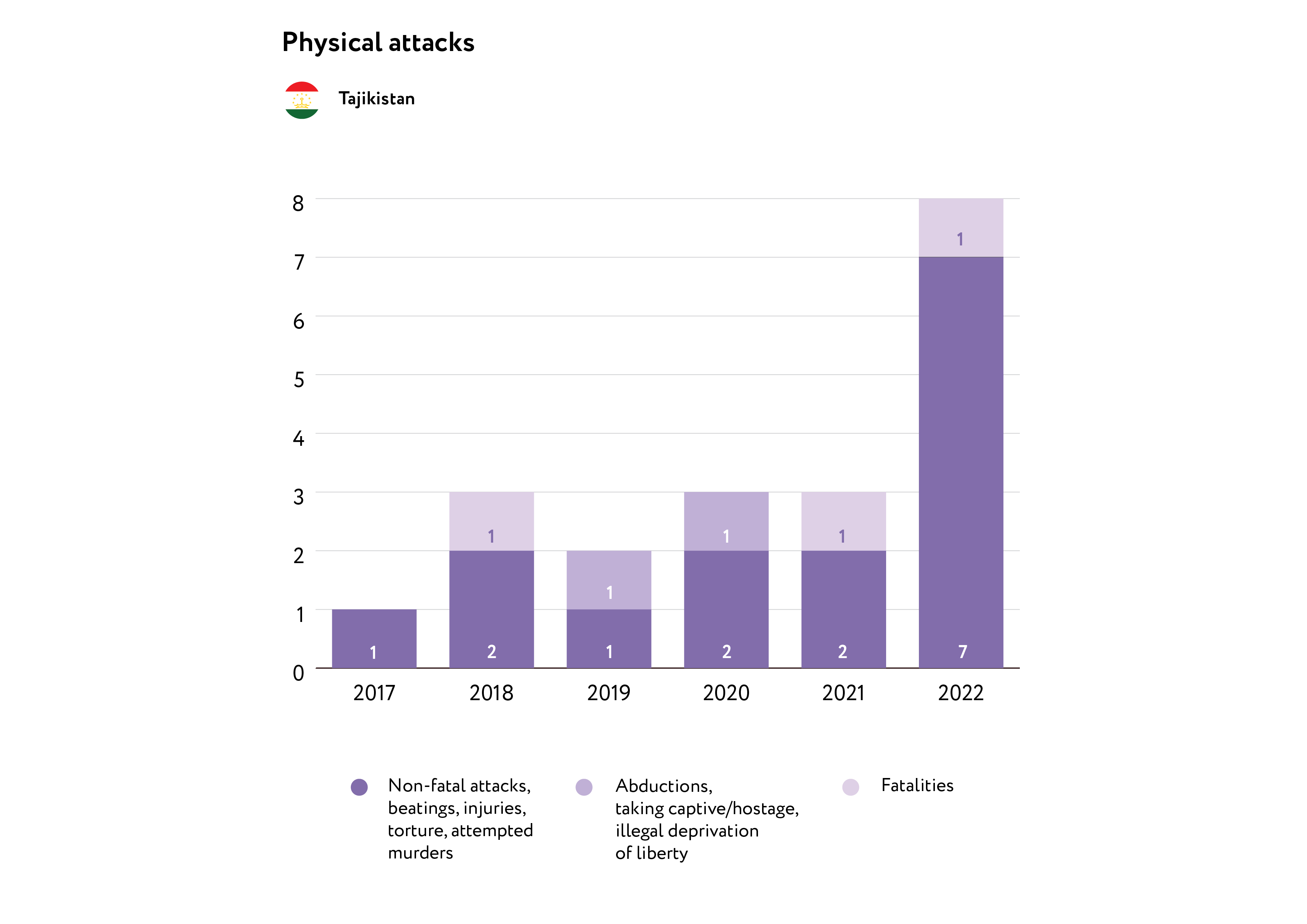
There was one fatal case (involving an unexplained sudden death) in 2022:
- On the night of August 12, Tajik TV and radio presenter and general director of the Avtoradio Tajikistan radio station, Faridun Khairullozoda, died in Dushanbe. He was 27 years old. His colleagues and friends said that he had taken his own life. At the request of relatives, the findings of the resulting investigation have not been disclosed.
There were also two incidents related to the kidnapping of journalists and unlawful conscription:
- On April 12, the presenter of the TV channel Dushanbe, Shokhruhi Ismoil, was kidnapped by employees of the military registration and enlistment office. He was forced into a taxi and taken to the military enlistment office. The same day, he was sent for military service in the east of Tajikistan. The abduction was filmed by passers-by and posted online.
- On October 24, independent journalist Dilshod Boltaev was detained on the street during a round-up of men of military age. He was in possession of a certificate of exemption but was detained nevertheless and taken to the military enlistment office, where this certificate was nullified. Boltaev was immediately sent for military service.
The remaining non-fatal incidents included:
- On May 17, journalists from Current Time TV and the Tajik branch of Radio Liberty were attacked in Dushanbe. Anushervon Aripov, Nasim Isamov, Mullorajab Yusufi and Barot Yusufi were dragged out of their cars by unknown attackers. Their equipment, including mobile phones, was stolen. Mullorajab Yusufi was struck several times in the head and torso. The attackers refused to identify themselves and upon being asked to return the equipment, simply responded: “You’ll get everything back.” The journalists were covering anti-government protests in the Gorno-Badakhshan Region.
- On the morning of May 19, a man in civilian clothes, claiming to be an electrician, knocked on the apartment door of Pomere.info journalist Khushruz Jumaev, asking for help. According to a source familiar with the case, when Jumaev opened the door, several law enforcement officers forced their way into the apartment, grabbed him, and forced him into an awaiting car. Jumaev’s parents searched for him at various government locations for five days before authorities called them and informed them that he was being held at the headquarters of the Organised Crime Control Department.
- On June 4, Daler Imomali, a Tajik journalist and blogger, said he was detained and interrogated for five hours. In a video posted on YouTube on June 4, the blogger said that representatives of several law enforcement agencies took part in the interrogation. He also said that he was struck several times, but added that he would not be able to prove this. Daler was arrested after he began working on a story about the demolition of houses in Dushanbe that were reported to be illegally built. He also said his interrogators deleted video footage from his phone, content he had filmed for the story.
- On October 19, Abdusattor Pirmuhammadzoda, an independent Tajik journalist, was arrested on suspicion of collaborating with banned organisations. In a letter sent from prison, Pirmuhammadzoda wrote: “I was beaten and electrocuted so badly that I wanted to die.” On October 19, a source close to the investigation provided Radio Ozodi with a copy of the letter, which Pirmuhammadzoda asked to be made public. It was confirmed on October 20 that the handwriting matched his previous statements.
- On December 15, journalist Bobojon Mukhtojov was attacked by an unknown individual on his way home from work. On December 26, the Ministry of Internal Affairs in Dushanbe reported the detention of a young man accused of hooliganism.
5/ NON-PHYSICAL AND/OR CYBER-ATTACKS AND THREATS
The number of recorded attacks in this category has increased almost three times compared with 2021. Once again, media workers in Tajikistan typically do not report these incidents. Most of these attacks were committed by unknown persons; in three cases the attacks were committed by government officials, and in three other cases, from individuals who were not representatives of the authorities.
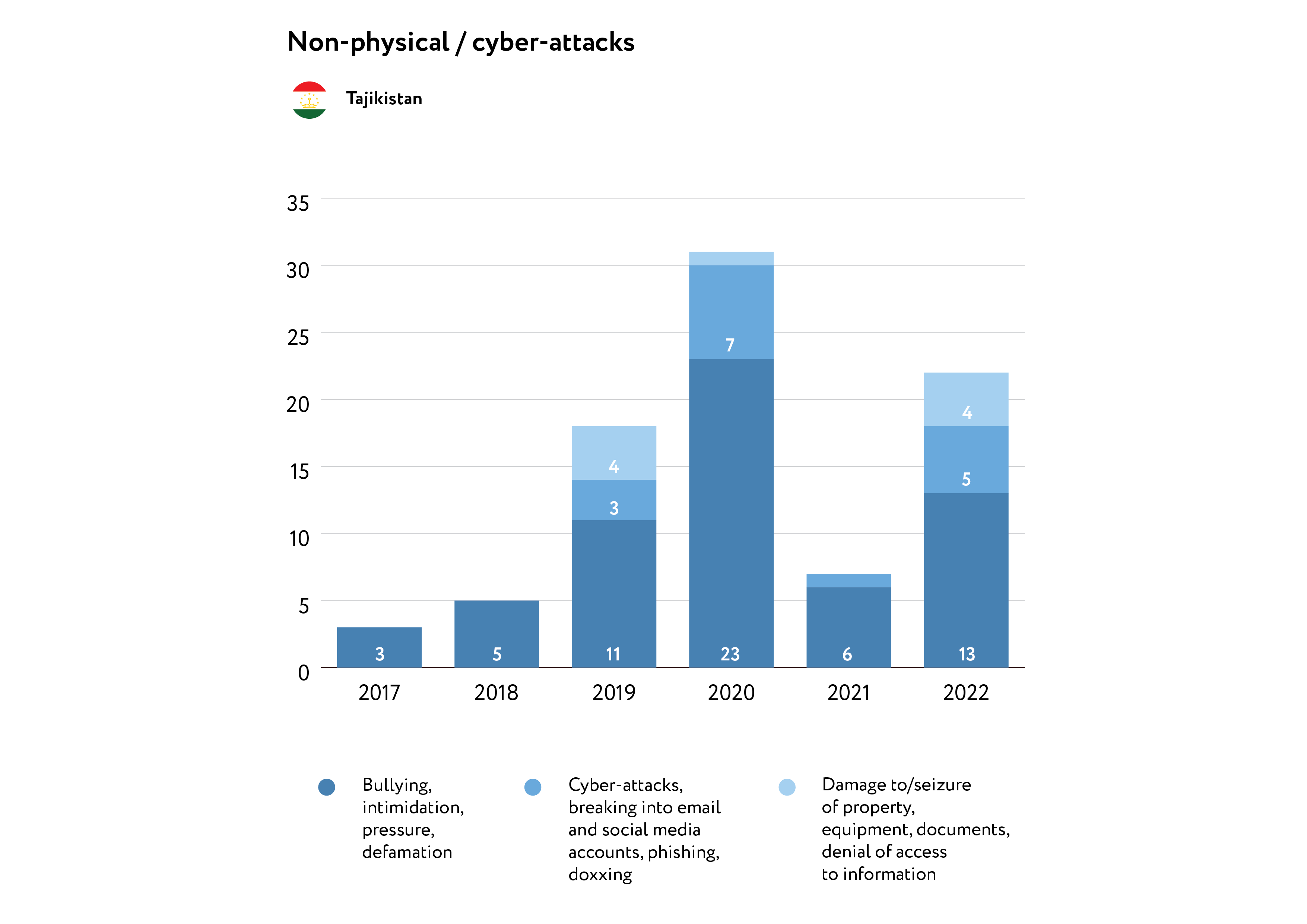
In 2022, there were five DDoS attacks recorded against online publications. These attacks took place after their coverage of the armed clashes on the Tajik-Kyrgyz border began. Online publishers uncovered calls from Kyrgyz activists to attack Tajik online media.
- On September 18, the online publications Your.tj and Farazh.tj were subjected to DDoS attacks by unknown individuals. The attacks lasted for more than two days, and the sites were available intermittently until protection was installed.
- On September 20, a massive DDoS attack was carried out against the Asia-Plus news site, making it inaccessible for some time. The publication’s social media accounts were also hacked.
- According to Sugdnews editor Alisher Tolib, the publication’s website was subjected to a “fairly serious” and unexpected attack on September 20. According to Tolib, “the server did not have time to handle the increased traffic, which led to a significant slowdown in the server’s response to requests and a denial of service to some user requests.”
The main method of non-physical pressure, as has been the case in previous years, was the bullying, intimidation and slandering of media workers:
- On January 30, anonymous and fake accounts distributed a video on Tajik Facebook groups showing women dancing in a sauna. The video’s caption claimed one of these women was independent journalist Anora Sarkorova. Sarkorova had previously worked for the BBC Russian service, but after the Tajik Ministry of Foreign Affairs failed to renew its accreditation, she was left without work and was forced to leave the country.
- On February 14, a young man was detained in Dushanbe for threatening physical violence against Abdukodir Talbakov, journalist and director of the Lahouti Library. He was held in custody for 15 days. Talbakov believes that these threats were related to his social media posts, some of which include discussions of religious topics.
- On April 12, unknown persons spread offensive material on Facebook about independent journalist Anora Sarkorova, who currently lives in Prague and works to raise awareness of crimes against the residents of the Gorno-Badakhshan Autonomous Region.
- On May 24, journalist and civil society activist Ulfathonim Mamadshoeva and her ex-husband, General Kholbash Kholbashov, both of whom were arrested and accused of “organising and leading protests” in the Gorno-Badakhshan region, claimed on state television that they had been involved in the unrest in the cities of Khorog and Rushan. Mamadshoeva was accused of collaborating with “suspicious foreign organisations” and “providing information to foreign intelligence services”, making reference to “two employees of one of the Western embassies”. No further details were given.
- On May 25, journalist Ramzia Mirzobekova complained about a campaign of harassment against her that had begun in connection with the events in the Gorno-Badakhshan region. On May 25, 2022, she posted a screenshot of an article published on a Facebook group. The page in question is run by a group of Tajik intelligence service trolls known as “the answer factory”. The journalist claimed the State Committee for National Security interrogated her in connection with the arrest and case of Ulfathonim Mamadshoeva. Mirzobekova suspected that the author of the article had access to the transcripts of her interrogation at the State Committee for National Security, but claimed that the author misrepresented the facts expressed during the interrogations in order to slander her. Mirzobekova said that security services questioned her about her connection with Mamadshoeva, as well as with Russian reporter Andrei Serenko. She also said that the State Committee for National Security seized her phone and computer.
- On September 20, journalist Shahnoz Komilzoda, who works for the TV channel Iran International and who covered the conflict on the Tajik-Kyrgyz border, said she faced abuse on Facebook from Kyrgyz people whenever she published her reports. Her account was also blocked several times following widespread complaints. In addition to this, she received numerous threats and insults via direct messages.
- On November 16, an imprisoned Tajik independent journalist, Daler Imomali, revealed details of his case in a letter he sent from a pre-trial detention centre, and addressed to President Emomali Rahmon. A copy of the letter was also obtained by news agency Asia-Plus. Imomali wrote that he did not recognise the October 17, 2022 verdict issued by the Shokhmansur district court, whereby he was sentenced to 10 years in prison. He argued that the investigation and trial were “full of lies, slander and duplicity”. Towards the end of the letter, he asked that any video footage of him, and of fellow journalists Abdullo Gurbati, Zavkibek Saidamini and Abdusattor Pirmuhammadzoda, should not be trusted, since “the video was recorded illegally, under duress.”
- On November 28, independent journalist Nurangez Rustamzoda was harassed on social media after a photograph emerged of her with a Kyrgyz journalist at the MediaFest festival in Almaty. She was threatened via direct messages, and people using anonymous accounts demanded that she apologise to the Tajik people for the photo with the journalist, who was referred to as “the enemy”.
There was one recorded case of an insult being directed towards a Tajik journalist by the Russian authorities:
- On May 13, Russian Foreign Minister Sergei Lavrov insulted Anushervon Aripov, a correspondent for the Current Time TV channel in Dushanbe. “May I ask you a question from the foreign media?” Aripov asked following a press conference at the Kokhi Somon presidential residence. “Go talk to the peacocks,” Lavrov responded, gesturing to the birds walking in a nearby park.
Tajik journalists are constantly harassed for opposing the war in Ukraine:
- On April 5, independent journalist Liliya Gaisina was subject to abuse on social media due to her position on Russia’s invasion of Ukraine.
6/ ATTACKS VIA JUDICIAL AND/OR ECONOMIC MEANS
In 2022, 62 attacks via judicial means were recorded, compared to six in the previous year. The main methods of exerting pressure were interrogations, searches, confiscations of personal belongings and court summons, as well as arrests and restrictions on freedom.
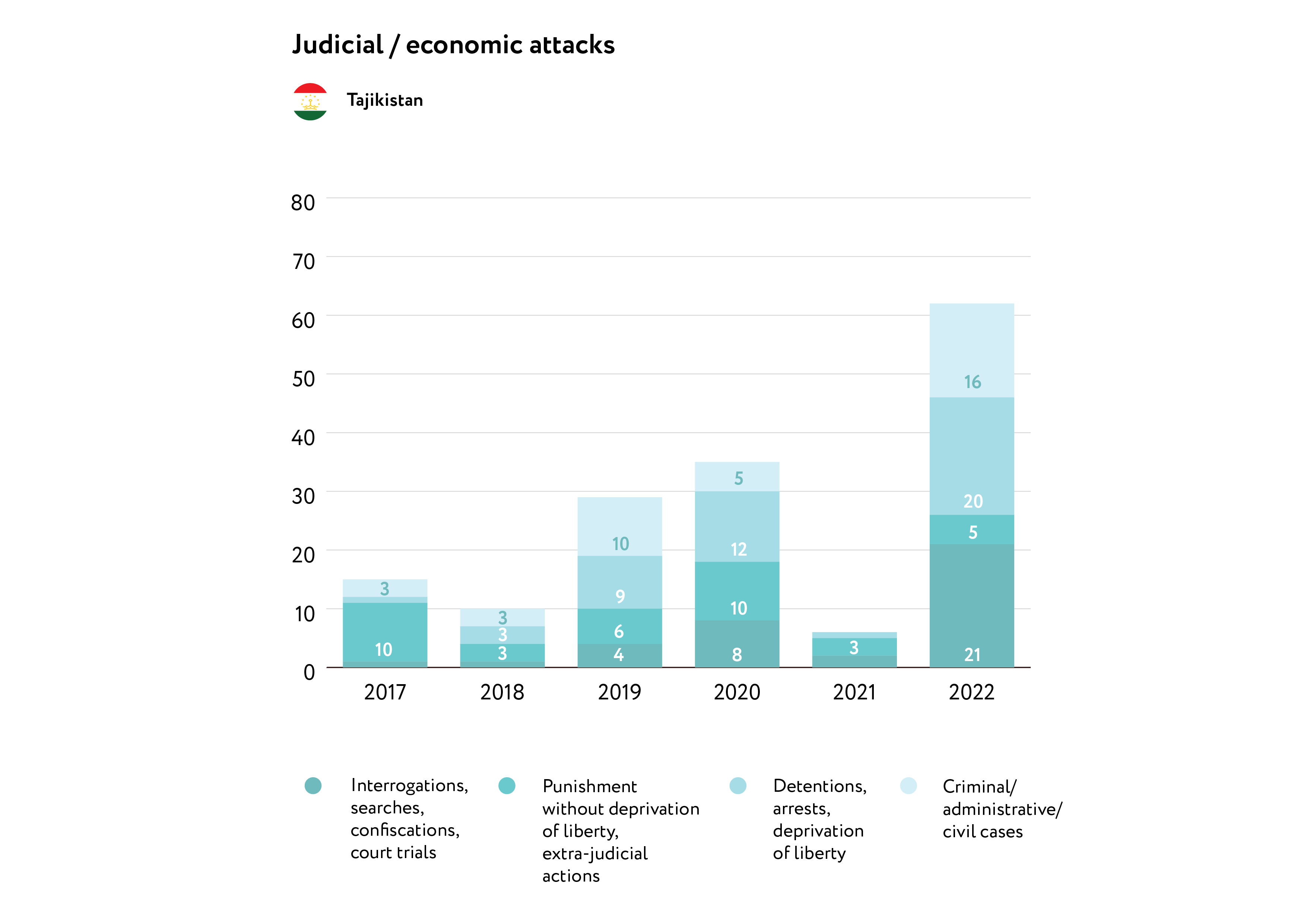
Almost all interrogations of journalists were carried out by employees of the Department for Combating Organised Crime (part of the Ministry of Internal Affairs):
- On May 22, journalist Ramzia Mirzobekova was asked to report to the State Committee for National Security, where authorities conducted an interview with her. Mirzobekova was released, but all her electronic devices, including her laptop, were confiscated.
- On June 4, Daler Imomali, a Tajik journalist and blogger, said he was detained and interrogated for five hours. In a video posted on YouTube on June 4, the blogger said that representatives from several law enforcement agencies took part in the interrogation.
- On June 24, investigators from the Shokhmansur prosecutor’s office interrogated an employee of the Asia-Plus news agency, Emomali Saidzoda, for three hours. They confiscated the journalist’s phone and forced him to sign a non-disclosure agreement about the interrogation.
- On July 12, the editor of Farazh newspaper, Muhammadnazar Najmiddinov, was summoned for questioning by the Department for Combating Organised Crime, during which all his equipment was confiscated.
At least eight independent journalists and bloggers were given long prison sentences:
- On September 3, the Sino district court sentenced Mamadsulton Mavlonazarov (Muhammad Sulton), an independent journalist and ex-employee of the Tajik State Security Services, to seven years in prison. Mavlonazarov was found guilty of “calling for a violent change in the constitutional order in the media or online” (Part 2 of Article 307 of the Criminal Code) and “insulting a government official in the media or online” (Part 2 of Article 330). Mavlonazarov was arrested while he was still in bed early in the morning of June 16.
- On October 4, journalist Avazmat Gurbatov (Abdullo Gurbati) was sentenced to seven years and six months in a maximum security prison colony. He was found guilty on three counts: “using violence against a government official” (Part 1 of Article 328 of the Criminal Code), “insulting a government official” (Part 1 of Article 330) and “organising the activities of an extremist organisation” (Part 2 of Article 307, Appendix 3). Gurbati was detained in mid-June along with blogger Daler Imomali. The journalists were working on crucial reports about the work of government agencies.
- On October 7, a Dushanbe court sentenced Moscow-based blogger Komyor Mirzoev to 10 years in prison (Part 2 of Article 187 of the Criminal Code). Law enforcement officials in Tajikistan accused him of criminal activity. The blogger was detained on September 5 in Moscow at the request of the Tajik security services. On September 7, the Lefortovo prosecutor’s office decided to release Mirzoev, who had been put on an international wanted list by the Ministry of Internal Affairs of Tajikistan. According to his relatives, the blogger was released from the Maryino temporary detention centre at around 9 pm, after his extradition was cancelled. On September 11, it became known that he was being held in a pre-trial detention centre in Dushanbe.
- On October 17, blogger Daler Imomali was sentenced to 10 years in a maximum security prison colony. He was also ordered to pay a fine. Imomali was found guilty on three counts: “involvement in illegal businesses”, “spreading knowingly false information” and “taking part in the activities of a banned organisation”.
- On November 3, the Ismoili Somoni district court sentenced independent journalist Zavkibek Saidamini to seven years in prison. The verdict was announced while Saidamini was being held in a pre-trial detention centre. The journalist was accused of being involved with the Islamic Renaissance Party and Group 24, both of which are banned. He has emphasised on several occasions that he has no affiliation with any organisation, party, or group. Both organisations also deny any cooperation with the journalist. The General Prosecutor’s Office announced the arrest of the journalist on July 15.
- On December 5, the Supreme Court of Tajikistan sentenced human rights activist and independent journalist Ulfathonim Mamadshoeva to 21 years in prison on charges of organising protests in the Gorno-Badakhshan region. Authorities listed her as one of the organisers of the protest rally in Khorog on May 16. As the journalist’s relatives told the Fergana News Agency, employees of the State Committee for National Security took her from her home on the morning of May 18. In addition to this, a search was conducted in Mamadshoeva’s apartment while her family was present. The journalist’s ex-husband, Kholbash Kholbashev, a General at the State Committee for National Security and a native of the Gorno-Badakhshan region, was also detained.
- On December 6, blogger and Pomere.info journalist Khushruz Jumaev (Khushom Gulyam) was sentenced to eight years in prison by the Supreme Court. Jumaev was accused of “organising an unauthorised rally” and “calling for a violent change in the constitutional order”. He ran a YouTube channel on which he discussed the history, languages, and culture of the Pamiri people. On the morning of May 19, a man in civilian clothes, claiming to be an electrician, knocked on Jumaev’s apartment door, asking for help. When Jumaev opened the door, several law enforcement officers forced their way into the apartment, grabbed him, and forced him into an awaiting car. Jumaev’s parents searched for him at various government locations for five days before authorities called them and informed them that he was being held at the headquarters of the Organised Crime Control Department.
- On December 26, independent journalist and blogger Abdusattor Pirmuhammadzoda was sentenced to seven years in prison. The blogger was found guilty under Part 2 of Article 307 (Appendix 3) of the Criminal Code (“organising the activities of an extremist organisation”). Pirmuhammadzoda was arrested on July 7. Employees of the Department for Combating Organised Crime in the city of Vahdat interrogated Pirmuhammadzoda for several hours, searched his house and confiscated his phone. On July 9, he was invited to return to the department, having been told his phone would be returned to him. He never returned home. It later became known that Pirmuhammadzoda had been arrested on July 9 for disobeying police orders and remained in custody until July 19.
The practice of exerting pressure on journalists through their family and friends continued. At least seven attacks of this nature were recorded, including:
- On February 3, Shokhida Mamajonova, the mother of Germany-based Tajik blogger Sherzod Mamajonov, was summoned to the Vakhdat City Department of Internal Affairs. She did not return home, and for a prolonged period, there was no information about her whereabouts. On February 4, Sherzod Mamajonov, talking with Radio Ozodi, said that his mother had most likely been detained by law enforcement agencies. “Last month, investigators took her mobile phone during an interrogation,” the blogger said. “On February 2, my mother received a call and was told that she could come and collect her mobile phone. She went to get the phone yesterday but never came back. More than 30 hours have passed, and there is still no information about her whereabouts. My father visited the Department of Internal Affairs. They said that she was not there.” Sherzod says that his mother was summoned for questioning twice by the Vakhdat Organised Crime Control Department in January. On April 8, 2022, it was revealed that a court in Dushanbe had sentenced Shokhida Mamajonovato to six years in a prison colony. The prosecutor accused Mamajonova of being involved with Group 24 and the Islamic Renaissance Party, both of which are banned in the country.
- On April 15, hooliganism charges were brought against both the mother and sister of the famous Tajik blogger Dzhunaidullo Khudoyorov. The first hearing was held at the Rasht District Court on April 15, 2022, where 66-year-old Mavzhigul Garibova and her 34-year-old daughter Valamat Khudoyorova were charged with causing bodily harm to Yashm resident Alisher Nasriddin. The defendants called the accusation “baseless and slanderous” and pleaded not guilty. However, Garibova was sentenced to two years under house arrest.
- On June 27, independent journalist Anora Sarkorova reported that her mother and brother were detained in Dushanbe by security forces and taken to an undisclosed location. Sarkorova’s relatives were released in the evening following a police interview.
ANNEX 1: OPEN SOURCES USED FOR GATHERING DATA (TAJIKISTAN)
- Asia-Plus – an independent news agency of Tajikistan.
- Eurasianet – an independent news organization that covers news from and about the South Caucasus and Central Asia, providing on-the-ground reporting and critical perspectives on the most important developments in the region.
- Fergana News Agency – a resource covering events in Central Asia.
- Radio Ozodi – the Tajik service of Radio Liberty.
- Reporters Without Borders – an international non-profit, non-governmental organisation that conducts political advocacy on issues relating to freedom of information and freedom of the press.
- Committee to Protect Journalists (CPJ) – an international non-governmental organisation that defends the rights of journalists.
- Other open-source media in the Tajik, Russian, and English languages are accessible on the internet network, as well as social networks.
